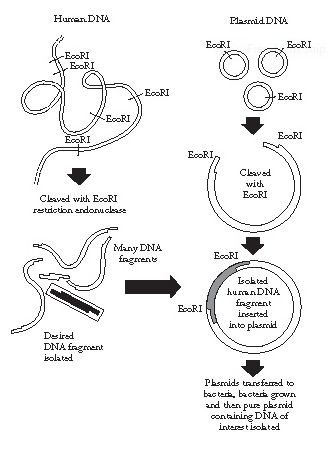Tools of Biotechnology
The basic process of recombinant DNA technology involves manipulating an organism’s DNA and thus altering the proteins being produced.
During this synthesis, DNA provides the genetic code for the placement of amino acids in proteins.
By intervening in this process, scientists can change the nature of the DNA, thereby changing the nature of the protein expressed by that DNA.
By inserting genes into the genome of an organism, the scientist can induce the organism to produce a protein it does not normally produce.
The technology of recombinant DNA has been made possible in part by extensive research on microorganisms during the last half-century.
One important microorganism in recombinant DNA research is Escherichia coli, commonly referred to as E. coli.
The biochemistry and genetics of E. coli are well known, and its DNA has been isolated and made to accept new genes.
The DNA can then be forced into fresh E. coli cells, and the bacteria will begin to produce the proteins specified by the foreign genes.
Such altered bacteria are said to have been transformed.
Knowledge about viruses has also aided the development of DNA technology.
Viruses are fragments of nucleic acid surrounded by a protein coat.
Viruses attack cells and replicate within the cells, thereby destroying them.
By attaching DNA to viruses, scientists use viruses to transport foreign DNA into cells and to connect it with the nucleic acid of the cells.
Another common method for inserting DNA into cells is to use plasmids, which are small loops of DNA in the cytoplasm of bacterial cells.
Working with a plasmid is much easier than working with a chromosome, so plasmids are often the carriers, or vectors, of DNA.
Plasmids can be isolated, recombined with foreign DNA, and then inserted into cells where they multiply as the cells
Interest in recombinant DNA and biotechnology heightened considerably during the 1960s and 1970s with the discovery of restriction enzymes.
These enzymes catalyze the opening of a DNA molecule at a “restricted” point, regardless of the source of the DNA.
The Figure below shows that a human DNA molecule is opened at a certain site by the restriction enzyme EcoRI (upper left), and the desired DNA fragment is isolated (lower left).
Plasmid DNA is treated with the same enzyme and opened. The DNA fragment is spliced into the plasmid to produce the recombinant DNA molecule.

The Figure above shows Construction of a Recombinant DNA molecule.
Certain restriction enzymes leave dangling ends of DNA molecules at the point where the DNA is opened. Foreign DNA can therefore be combined with the carrier DNA at this point. An enzyme called DNA ligase forges a permanent link between the dangling ends of the DNA molecules at the point of union.
Recombinant DNA technology is sophisticated and expensive. Genes must be isolated, vectors must be identified, and gene control must be maintained. Stability of the vector within a host cell is important, and the scientist must be certain that nonpathogenic bacteria are used. Cells from mammals can be used to synthesize proteins, but cultivating these cells is difficult. In addition, the proper gene signals must be identified, RNA molecules must be bound to ribosomes, and the presence of introns must be considered. Collecting the gene product and exporting it from the cell are other considerations.
The genes used in DNA technology are commonly obtained from host cells or organisms called gene libraries.
A gene library is a collection of cells identified as harboring a specific gene.
For example, E. coli cells can be stored with the genes for human insulin in their chromosomes.
Scholarship 2025/26
Current Scholarships 2025/2026 - Fully FundedFull Undergraduate Scholarships 2025 - 2026
Fully Funded Masters Scholarships 2025 - 26
PhD Scholarships for International Students - Fully Funded!
Funding Opportunities for Journalists 2025/2026
Funding for Entrepreneurs 2025/2026
***
